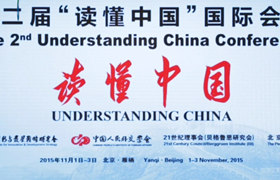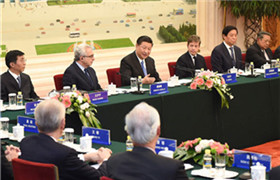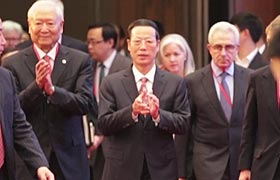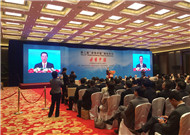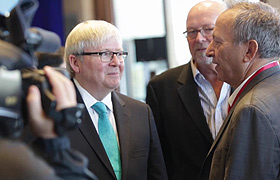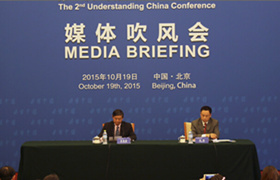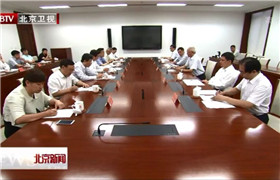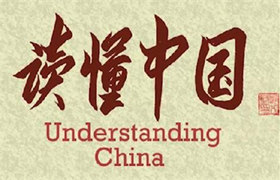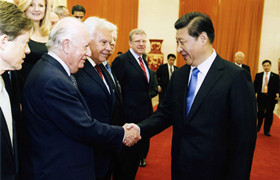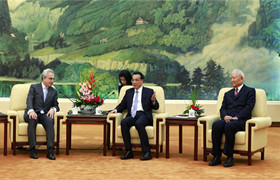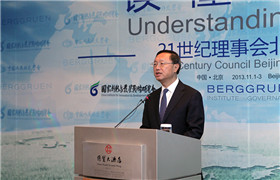- HOME--> Chairman
-
To achieve common development of the APAC by focusing on Sino-US cooperation
--Conversation with former National Security Advisor Stephen HadleySource:
Zheng BijianI. The year 2014 is both a year to make overall arrangements and a year of great challenges to China.
It means that China will be put to test during this year when the country is facing a great many problems and difficulties.
For Sino-US relations, the year 2014, and maybe 2015 too, is a critical period. We must act quickly to seize opportunities before they disappear. We remain positive about the prospects of Sino-US cooperation, which is based on our profound observation of this relationship and thus the conclusion that Sino-US relations must improve after all. That is a conclusion made by Deng Xiaoping and is in the best interest of both China and the US. I believe that is still the assessment held by the Chinese leadership.
II. There is tangible evidence to demonstrate that it is important, beneficial and feasible to further grow Sino-US relations. First, generally speaking, neither China nor the US would like to see violent confrontations or serious conflicts between the two countries. Secondly, the interests of the two countries are highly converged, first and foremost in economic cooperation. Thirdly, there are forces that intend to cause trouble in the relationship but they are neither strong enough nor well prepared. Therefore, it is important that China and the US keep sober-minded, maintain composure and take the right actions. If we fail in any of the three, the relationship will suffer badly.
III. Deeper, wider and more realistic observations of the general trends of the world are required. What is needed is true strategic vision rather than short-sighted considerations for selfish gains. There are voices in the US calling for encircling China. But how can you encircle China? You can only half-encircle the country from the sea. On the continent, China is bordering Siberia, the Central Asia, and beyond them, Russia and Europe. Therefore, encircling China is an impossible fantasy, with self-evident weakness. What is more realistic is to bring the two countries closer together. Suppression or encirclement will never work.
Some Americans are very worried about improved Sino-Russian relations. I believe good Sino-Russian relations and good Sino-US relations are not mutually exclusive but are mutually reinforcing instead. I don’t believe that “making good friends with the US” has been eliminated from the agenda of the Chinese leadership. The observation that this is a single choice question is simply superficial.
IV. Right now the crux in our relationship is the issue of the West Pacific. And the vital part of the US’s Asia-Pacific strategy is that Obama has publicly declared the US-Japan military alliance as the “cornerstone”, supporting Japan to lift bans on collective self defense and to nationalize Diaoyu island.
I believe that we should put things in historical and dialectical perspectives. The US-Japan military alliance was created a long time ago and there were some tortuous developments. The fact is the alliance was created to rein in Japan, and for that matter, to rein in Asia-Pacific. In the Cold War period, the alliance was mainly targeted against the Soviet Union and now the Pivot is targeted against China. As the US is not powerful enough, it seeks to leverage Japan, thus turning from controlling Japan to supporting Japan to lift the bans on collective self defense and to “nationalize the Diaoyu Island”, and working with Japan to reject China’s legitimate sovereignty. I would like to make it clear to our American friends that it might not take long to see that the stratagem of relying on the US-Japan military alliance to encircle China and condoning Abe’s wanton acts will prove counterproductive to the US, not only politically and morally but also in a tangible way.
V. In the final analysis, the only way to ensure Asia Pacific security is to achieve common development of the region by focusing on Sino-US cooperation and to avoid the mistakes of US-Soviet Cold War. This requires that we take the historical, strategic and moral high ground of recognizing “the Pacific is large enough” and developing a “new model of major country relationship” between China and the US.
Specifically, China and the US should focus on developing “convergence of interests” and building “communities of interests” in the following three areas now and in the future (in the first phase from now to 2020):
--- economically, to develop “convergence of interests” and build “communities of interests” that are mutually beneficial;
--- on security, to develop “convergence of interests” and build “communities of interests” focusing on peace and cooperation
--- on global governance, to develop “convergence of interests” and build “communities of interests” between China and the US that are characteristic of balanced rights and responsibilities.
This is an excerpt from Chairman Zheng Bijian’s conversation with visiting former National Security Advisor Stephen Hadley in Beijing on June 20, 2014. Mr. Hadley said at the end of the meeting that “our conversation is an exemplary strategic dialogue, in which problems are discussed honestly and fully, without any cliché. This is what strategic communication truly is.”
-
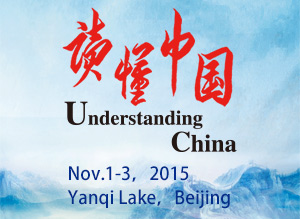
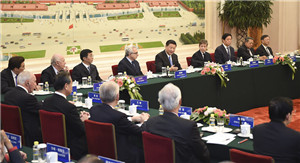
The 2nd "Understanding China" ConferenceOn November 1~3, 2015, the 2nd “Understanding China” Conference was held in Beijing Yanqi Lake International Conference Center. Zhang Gaoli, Vice Premier of the State Council, attended the opening ceremony.
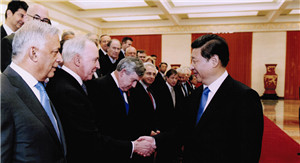
The 1st "Understanding China" ConferenceOn November 1~3, 2013, the 1st “Understanding China” Conference was held in Beijing, which was cosponsored by China Institute for Innovation & Development Strategy (CIIDS), Chinese People’s Institute of Foreign Affairs (CPIFA), and Berggruen Institute on Governance.
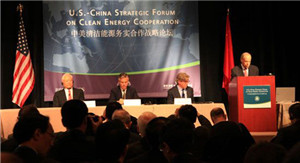
The 2nd U.S.-China Strategic Forum on Clean Energy CooperationWith the “Prospects for U.S.-China strategic cooperation in next decade” as its theme, the forum dwells on the implications of U.S.-China cooperation from the strategic perspective of coping with global challenges and maintaining world peace.
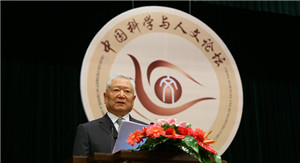
The China Sciences and Humanities ForumCo-initiated in April 2003 by renowned Chinese scientist Mr. Lu Yongxiang and influential political strategist Zhen Bijian, China Sciences and Humanities Forum was jointly hosted by Graduate University of Chinese Academy of Sciences (GUCAS) and the Higher Education Press.

